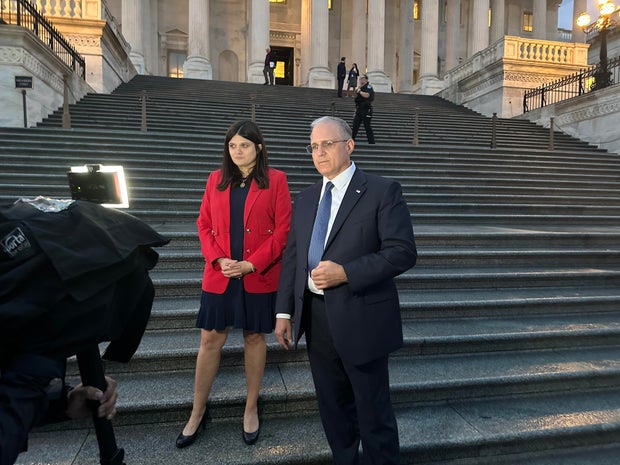CBS News
Paul Whelan, freed in prisoner swap with Russia, tells other American detainees: “We’re coming for you”

Washington — Nearly seven weeks after the Russians handed over Paul Whelan on a tarmac in Ankara, Turkey, the Marine veteran stood on the steps of the U.S. Capitol with a message for other Americans who are held abroad.
“We’re coming for you,” he told reporters Tuesday night after he met with lawmakers. “It might take time, but we’re coming.”
Whelan said he spoke with lawmakers about how the government can better support detainees after they’re released.
“We spoke about how the next person’s experience could be better,” he said. “What the government could do for the next person that’s held hostage and comes home — the care and support that other people might need, especially people that are in a worse situation. There are people coming back that lived in the dirt without shoes for three years, people that were locked up in hideous conditions for 20 years. They need support.”
CBS News
The U.S. secured Whelan’s release in August in one of the largest prisoner swaps since the end of the Cold War. The complex deal came after months of sensitive negotiations between the U.S., Russia, Germany, Slovenia, Poland and Norway.
As part of the deal, Russia released 16 prisoners while the Western countries released eight Russians. Whelan was released alongside Wall Street Journal reporter Evan Gershkovich, Russian-American radio journalist Alsu Kurmasheva and Vladimir Kara-Murza, a U.S. green card holder and Kremlin critic.
Whelan, who had been the longest-held American detainee in Russia, was arrested in December 2018 when he traveled to the country to attend a friend’s wedding. He was convicted of espionage in a secret trial and sentenced to 16 years in prison in 2020.
Whelan, his family and the U.S. government vehemently denied that he was a spy and accused Russia of using him as a political pawn. The U.S. government considered him to be wrongfully detained, a rare designation that put more government resources toward securing his release.
But a deal to secure his freedom was long elusive. He remained behind bars as Russia freed Marine veteran Trevor Reed and women’s basketball star Brittney Griner — both of whom were detained after Whelan’s arrest — in prisoner swaps with the U.S.
The U.S. said it pushed for his inclusion in both exchanges, but Russia refused. It led to Whelan advocating for his own release from a remote prison camp, calling government officials and journalists to make sure that he wasn’t forgotten.
When the plane carrying Whelan, Gershkovish and Kurmasheva landed in Maryland on Aug. 1, Whelan was the first to disembark. He was greeted by President Biden, who gave Whelan his American flag pin, and Vice President Kamala Harris.
“Whether he likes it or not, he changed the world,” Rep. Haley Stevens, a Michigan Democrat, told reporters Tuesday.
Whelan’s case and his family’s constant pressure on the U.S. government brought more attention to the cases of Americans who are wrongfully detained by foreign governments.
Haley said Whelan is a reminder to other Americans considering traveling to Russia that “you have a target on your back.”
Whelan said it’s been an adjustment acclimating to life back in the U.S., especially learning the latest technology like his iPhone 15.
“I was in a really remote part of Russia,” he said. “We really didn’t have much. The conditions were poor. The Russians said the poor conditions were part of the punishment. And coming back to see this sort of thing now is a bit of a shock, but it’s a good shock.”
CBS News
News details emerge about Utah mother, 3 young children killed at their home

A Utah mother who police believe was shot and killed by her husband along with three of their children was a refugee who fled violence in Myanmar and dreamed of thriving with her family in the U.S., relatives said Thursday.
Police believe the husband killed his family before shooting himself, and a teenage son was badly wounded.
The bodies of Bu Meh, 38, along with her daughters Kristina Ree, 8, and Nyay Meh, 2, and son Boe Reh, 11, were found in their home in West Valley City, a Salt Lake City suburb, on Tuesday. A handgun was found under the father Dae Reh, 42, leading police to believe this was a murder-suicide, but no evidence of a motive has been released.
One child, 17-year-old Sha Reh, survived being shot in the head and is hospitalized with a severe brain injury, police said.
Bu Meh, a member of Myanmar’s Karenni ethnic minority, fled what her relatives described as ethnic cleansing in the Southeast Asian nation about 10 years ago. She and her small family lived for a time in a refugee camp in Thailand, then came to the United States “with little more than the clothing on their backs,” the family said in a statement.
She taught herself English, learned new skills and worked hard to support her growing family, achieving a way of life “far beyond the nightmare of her former country or the refugee camp,” the family said.
“For reasons that we cannot comprehend, her husband robbed her and their children of that security and their very lives,” her family said.
Police believe the shooting happened over the weekend.
Police initially went to the home Monday night after a relative asked them to check on the family but did not find any sign of an emergency that would allow them to enter the home. The relative went to the home Tuesday, saw Sha Reh wounded in the garage and called police, who found the bodies inside the home.
In their statement, relatives called Sha Reh their hero and said he faces a “long and complex road to recovery.” An online fundraiser is collecting donations to pay for his care and to help him go to college.
“After moving into their own home and finally enjoying a level of prosperity far beyond the nightmare of their former country or the refugee camp in Thailand in which they lived for a season, and for reasons that we cannot comprehend,” the family wrote, “her husband robbed her and their children of that security and their very lives.”
Neighbors hadn’t reported any gunshots in the area over the weekend, police spokesperson Roxeanne Vainuku said at a news conference Wednesday. The family had no previous reports of domestic violence or other disturbances.
One neighbor spoke to CBS affiliate KUTV about the shock they felt.
“How can a father shoot his children?” neighbor Mike Webster told the station. “I just can’t grasp for that concept at all. I can just see that poor little two-year-old looking at her daddy.”
This Utah case is the 38th mass killing in the United States this year. At least 165 people have died this year in U.S. mass killings, which are defined by the FBI as cases in which four or more people die within a 24-hour period, not including the killer.
Mark Barden, whose child was killed in the 2012 Sandy Hook school shooting, urged Utah lawmakers to pass Red Flag laws after the incident in Utah, KUTV reported.
“When it is recognized that an individual is in crisis, measures to safely and temporarily remove firearms from their possession are proven to save lives,” Barden said.
CBS News
Two journalists killed in northern Syria

A journalists’ association says two journalists working for Kurdish media outlets were killed in northern Syria while covering fighting between Turkish-backed fighters and Syrian Kurdish militia.
The Turkey-based Dicle-Firat Journalists Association said Friday that Nazim Dastan and Cihan Bilgin were killed Thursday when their vehicle was reportedly targeted by a Turkish drone on a road near the Tishrin Dam.
Tishrin Dam, located some 56 miles east of Aleppo, has been the scene of clashes between the U.S.-backed Syrian Democratic Forces, SDF, and the Turkey-backed opposition forces.
There was no immediate comment from Turkish officials.
Bianet, a news website dedicated to human rights issues, said Bilgin was a reporter for the Kurdish Hawar News Agency, while Dastan worked as a freelance journalist for the Firat News Agency, which is associated with the militant group, the Kurdistan Workers’ Party (PKK).
Turkey considers the SDF a terrorist organization because its main component is a group aligned to the PKK.
The group has been engaged in an armed struggle against the Turkish state since the 1980s in pursuit of its objective of securing autonomy for Kurds in the country.
CBS News
Stuffing stockings with skincare? Here’s what experts say kids should (and shouldn’t) be using.

Skin care is all the rage for teens and tweens these days. But if you’re hunting for last-minute skincare stocking stuffers, be aware that experts warn some products could cause more harm than good.
Dr. Sheilagh Maguiness, a dermatologist and president of Society for Pediatric Dermatology told CBS News earlier this year it’s important to look for age-appropriate products for young skin.
“What’s not good about caring for your skin, washing your face, wanting to establish good healthy skin care habits early? That’s great,” Maguiness said. “But what’s not great is the fact that some of the products that are being marketed to tweens and teens are not necessarily good or appropriate for their skin.”
So if you’re deciding on skincare gifts, here’s what’s safe and what’s best to skip.
Safe: Cleanser and sun protection
Using a gentle cleanser once or twice a day to wash your face is a great first step for those around age 11 or 12, Maguiness said.
“Even tweens could wash their face twice a day; as young as 8, that would be just fine,” she said.
After washing your face in the morning, Maguiness suggests applying a sunscreen with SPF 30 or greater. Then in the evening, swap that out for a gentle moisturizer.
“The only preventative product that you need in an arsenal at any age is sunscreen,” she said. “It is the No. 1 thing you can do to prevent your skin from aging and to prevent, even more importantly, the risk for skin cancer down the line.”
Skip: Harsh ingredients
Some harsh ingredients for young people to avoid include alpha and beta hydroxy acids (AHA and BHA), alcohol, highly fragranced products, and retinols and retinoids, plastic surgeon Dr. Smita Ramanadham, told CBS New York earlier this year.
“The biggest category to really avoid are those anti-aging products,” she said. “Young skin just does not need it. Young skin has collagen, elastin, it is hydrated, so we don’t need to add these extra ingredients that are really going to irritate and cause inflammation.”
Maguiness said she sees young girls come into her clinic with bags of unnecessary and potentially risky products.
“They’re actually damaging their skin barrier. They’re drying themselves out. They’re getting irritant dermatitis,” she said. “They’re using products that really just aren’t appropriate for the type of skin that they have.”







